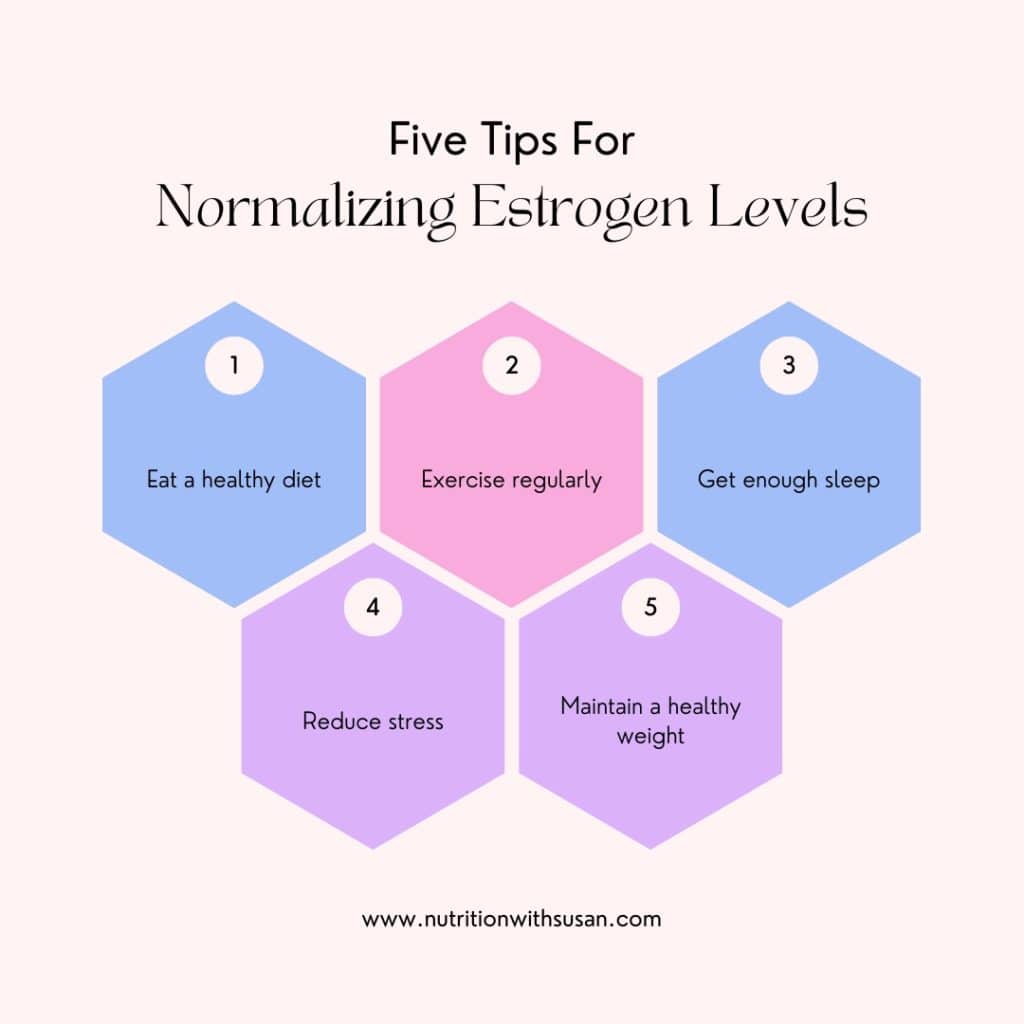INTRODUCTION
Estrogen is a hormone that plays a vital role in reproductive health, but when levels are too high or too low, it can lead to serious health problems – like autoimmune issues. Oh great, like I don’t have enough problems to deal with, right?
Well unfortunately, autoimmune disease is one of those conditions that can be caused by imbalanced estrogen levels.
In this blog post, we’ll explore the possible autoimmine and estrogen connection in women, as well as five nutrition and lifestyle tips tohelp normalize your estrogen levels.
The Autoimmune And Estrogen Connection
Autoimmune disease occurs when the body’s immune system attacks healthy cells by mistake. There are more than 80 types of autoimmune diseases, and they range from relatively mild conditions like psoriasis to life-threatening diseases like lupus.
According to the American Autoimmune Related Diseases Association (AARDA), women are two to three times more likely than men to develop an autoimmune disease. In fact, autoimmune diseases are one of the leading causes of death in women under the age of 65.
There are a variety of factors that can contribute to the development of an autoimmune disease, but one of the most important is imbalanced hormone levels.
Hormones play a vital role in regulating the immune system, and when levels are out of control, it can lead to autoimmunity.
This is why women are more susceptible to autoimmune diseases; hormonal changes that occur during puberty, pregnancy, and menopause can trigger autoimmunity. Estrogen is one of the hormones that has a particularly strong impact on autoimmunity.
Too much estrogen can suppress the immune system and increase inflammation, while too little estrogen can cause the immune system to overreact and attack healthy cells. Imbalanced estrogen levels are a common cause of autoimmune disease in women.
In fact, some studies have shown that women with certain types of autoimmune diseases have higher than normal levels of estradiol, an estrogen hormone.

The Autoimmune And Estrogen Connection: 5 Lifestyle Tips To Help Normalize Estrogen Levels
So, what can you do to normalize your estrogen levels and reduce your risk of autoimmune disease? Here are 5 nutrition and lifestyle tips to help you get started:
- Eat a healthy diet. Seems obvious, right? A healthy diet is essential for maintaining normal hormone levels. Eat plenty of fruits, vegetables, and whole grains, and limit your intake of processed foods, sugar, and alcohol. Your body wants and needs a variety of colors from real food daily. For example, red foods help promote heart health; orange and yellow foods are good for your eyes and skin; green foods promote healthy digestion; and blue and purple foods may help prevent certain cancers.
- Exercise regularly. Exercise helps to regulate hormone levels and reduces stress, which can also contribute to autoimmunity. Aim for 30 minutes of moderate exercise most days of the week. Activities like a 15-minute morning yoga flow glass, 5-minute walks throughout the day, or short bouts of high intensity exercise are examples of good strategies to add to your routine.
- Get enough sleep. Sleep is crucial for hormone balance. Some nutrients that help support better sleep are: Magnesium, Vitamin D, Melatonin, Resveratrol, CBD, and GABA. Sleep trackers get mixed reviews as they help some folks but others find these may hinder their sleep or may even affect their mood if the tracking device gives a poor sleep rating. Trackers are just one piece of the puzzle when it comes to sleep so be sure to use them in a positive manner.
- Reduce stress. Chronic stress can disrupt hormone balance and contribute to autoimmunity. Find ways to reduce stress in your life through relaxation techniques like yoga or meditation. Did you know there are tools out there to help assess your stress – the Oura ring, your Apple Watch, and the Sweetwater health app can be helpful. Questionnaires like The Perceived Stress Scale, LEDS (Life Events and Difficulties Scale), and STRAIN (The Stress and Adversity Inventory) may also be beneficial.
- Maintain a healthy weight. We all know diets don’t work. Why? Well, 3 reasons – They aren’t sustainable, they fail to improve or may even compromise your overall health, and they don’t address the elephant in the room i.e., the root cause of excess weight – things like trauma, mental health, and relationships. Better nutrition/lifestyle guidance and support from a licensed healthcare practitioner is a great way to help you discover your better, not perfect choices for achieving your personal goals.
Conclusion: The Autoimmune And Estrogen Connection
All in all, understanding the autoimmune and estrogen connection can be intimidating and overwhelming. Though it is not always easy – especially when feeling overwhelmed by symptoms- a health journey can begin with understanding how this delicate balance works, from treatments to lifestyle changes, that can bring these levels back into the normal range.
It’s crucial that women educate themselves on how to maintain balanced hormone levels, rather than living life in denial. Normalizing estrogen could help reduce inflammation and disease activity, meaning more energy and better quality of life!
Don’t ever just live with sickness and lose site of the joy of living – you deserve to have a life filled with happiness and purpose just like anyone else.
If you’re looking to make some powerful health changes, it’s always a great idea to start with your hormones. Ready for the challenge? Let’s do it!
If you’re ready to take action and get to the root causes of your autoimmunity issues, check out my programs for holistic healing and empowerment! You’ve got this!
***Disclaimer: This post is for informational purposes only and should not be construed as medical advice***


